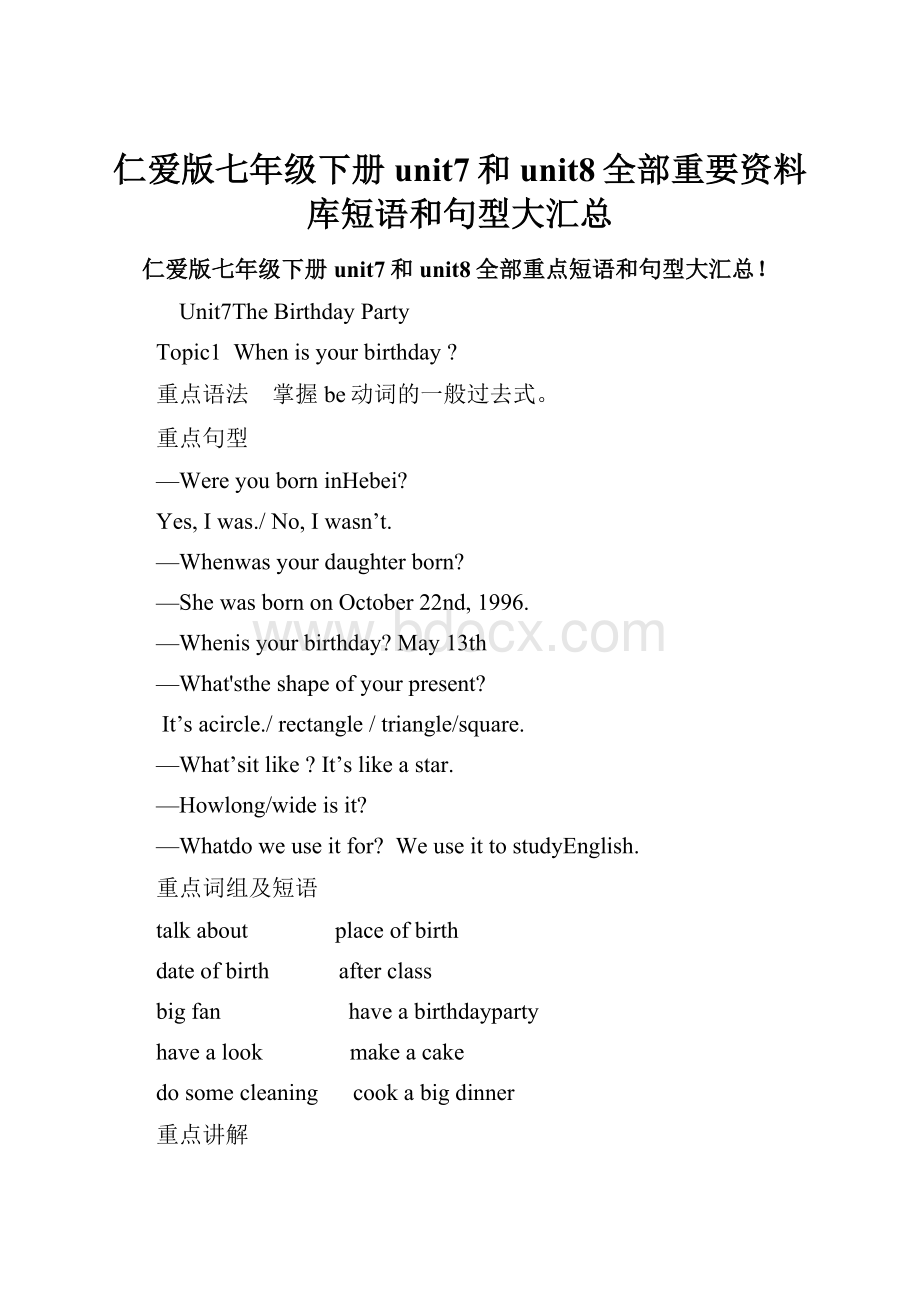仁爱版七年级下册unit7和unit8全部重要资料库短语和句型大汇总.docx
《仁爱版七年级下册unit7和unit8全部重要资料库短语和句型大汇总.docx》由会员分享,可在线阅读,更多相关《仁爱版七年级下册unit7和unit8全部重要资料库短语和句型大汇总.docx(14页珍藏版)》请在冰豆网上搜索。

仁爱版七年级下册unit7和unit8全部重要资料库短语和句型大汇总
仁爱版七年级下册unit7和unit8全部重点短语和句型大汇总!
Unit7TheBirthdayParty
Topic1 Whenisyourbirthday?
重点语法 掌握be动词的一般过去式。
重点句型
—WereyouborninHebei?
Yes,Iwas./No,Iwasn’t.
—Whenwasyourdaughterborn?
—ShewasbornonOctober22nd,1996.
—Whenisyourbirthday?
May13th
—What'stheshapeofyourpresent?
It’sacircle./rectangle/triangle/square.
—What’sitlike?
It’slikeastar.
—Howlong/wideisit?
—Whatdoweuseitfor?
WeuseittostudyEnglish.
重点词组及短语
talkabout placeofbirth
dateofbirth afterclass
bigfan haveabirthdayparty
havealook makeacake
dosomecleaning cookabigdinner
重点讲解
1 英语中日期可以有两种表达法:
(1)月日,年。
May1st,2008
(2)日月,年。
1stMay,2008
2 plantodosth.计划做某事
3 基数词变序数词的规律:
基变序,有规律;一、二、三,特殊记;
从四起,th; 八去t来九去e; ve要用f替。
整十该y为ie,后面再跟th;
几十几和几百几,只变个位就可以。
4 介词in,on,at 在时间前面的应用
1)在上下午、傍晚用in inthemorning intheafternoon intheevening
2)在季节、年、月前用in,inspring/summer/fall/winter in2002,inJuly,inFebruary,2001
3)在具体的某一天及某一天的上下午、晚上用on onSaturday,onWednesdayevening.
onthemorningofJune1st, onJanuary2nd,2014
4) 在中午、夜间、时刻前用at。
atnight, atnoon,atseveno’clock,athalfpastseven
5 表示确切“几百”时,hundred后面不加“s”,但表示不确定数目的“数以百计”时,hundred后面应加“s”,用“hundredsof”表示。
threehundredstudents三百名学生 hundredsofstudents几百名学生
6 英语中表达物体的长、宽、高,先说数字,再说单位,最后加上一个表示长、宽、高的形容词。
“.”读做“point”。
6.4米长 sixpointfourmeterslong
7 Whatdoweuseitfor?
我们用它来做什么?
usesth.todosth.用某物做某事.=usesth.fordoingsth.
8 buysb.sth.=buysth.forsb.买某物给某人
9 what’stheshapeofyourpresent?
=Whatshapeisyourpresent?
10 What’sitlike?
=Whatdoesitlooklike?
11 It’slikeastar.=Itlookslikeastar.
12 Igetit. 我明白了。
13 Youareright. 你说的对。
语法讲解 be动词的一般过去时
1.be动词的一般过去时,表示过去存在的状态。
Mybrotherwasatschoolyesterday.
2.be动词的过去式为was/were,其否定式为wasnot/wasn’t和werenot/weren’t.
3. 一般疑问句以及简略回答:
—WereyouborninJuly,1999?
—Yes,Iwas./No,Iwasn’t.
Topic2 CanyousinganEnglishsong?
重点词组及短语
atKangkang’sbirthdayparty dancetodisco
playtheguitar playthepiano
performballet singEnglishsongs
readEnglishbooks makemodelplane
takephotos drawpictures
somany inthepast
attheageof withone’shelp
not…anymore
重点句型
1 I’msurewe’llhaveagoodtimeattheparty.我确定我们在集会上玩得高兴。
2 Youaresosmart!
你真聪明!
3 I’dliketotaketheseflowerstotheparty.我想把这些花带到集会上。
4 Whatelsecanyoudo?
你能做别的什么?
5 Happybirthdaytoyou!
6 Therewassomethingwrongwithhereyes. 他的眼睛有了毛病。
7 Lifewashardforher. 生活对他来说很艰难。
重点讲解
1巧辩异同 take与bring take (从说话人处带到别处)带去,带走
bring (由别处带到说话人处)带来
2 一段时间+ago是表示过去的时间状语。
twoyearsago , threemonthsago
3 begoodatdoingsth.=dowellindoingsth.擅长做某事,在……方面做得好。
4 withone’shelp=withthehelpof… 在……的帮助下
5 It’stimefor….到…时间了.相当于It’stimetodosth.
6 both,all 的用法
both两者都,all三者以上都
7 Therewassomethingwrongwithhereyes. 这个句型主语是something 谓语动词用is/was. 在否定句和疑问句中用anything。
eg. Isthereanythingwrongwiththeboy?
Therewasn’tanythingwrongwithhercomputer.
8 Withone’shelp=withthehelpof 在……的帮助下
重点语法 及选择疑问句
一、情态动词掌握情态动词can/can’t,could/couldn’t的用法
1.I______swimattheageoften,butnowI____swimverywell.
2. ____youplaytheguitar?
No,I_______.
3.Whatelse_____youdo?
I_____alsoperformballet.
4._____hedrawpictureswhenhewasfiveyearsold?
No,he_______.
5.Oneyearago,he_____doitatall.
二、选择疑问句
选择疑问句是两个一般疑问句连成的句子,用or连接,相同的部分略
Topic3 Everyonehadagoodtime
重点语法 行为动词的一般过去时及其回答。
重点句型
—Didyousingasongattheparty?
—Yes,Idid/No,Ididn’t.
Imissedthechairandfelldown.
Howcouldyoulietome?
Kangkangmadeasilentwishandthemheblewthecandlesoutinonebreath.
重点词汇
playthepiano playtheguitar
playerhu peformmagictricks
enjoyoneself performChineseKungfu
dancetodisco playagame
falldown missthechair
hurtoneself atonce
lastnight gethome
nexttime haveabirthdayparty
makeacard byhand
makeawish blowout
重点讲解
1 DidKangkangenjoyhimself?
康康玩得开心吗?
Enjoy是及物动词,后接名词,代词或是动名词,意为“喜爱,欣赏,享受……的乐趣。
”
enjoyoneself=haveagood/greattime玩得愉快 enjoydoningsth. 喜欢做某事
巧辩异同 like,love与enjoy
(1)like喜欢(程度较弱)likedoing/todo
(2)love热爱(程度较强)lovedoing/todo
(3)enjoy喜爱,欣赏,享受……的乐趣enjoydoing
2 It’syourturn.该你了。
turn 是名词,意思是“轮流”,It’sone’sturntodosth.轮到某人做某事。
还可以做连系动词,意为“变成……”,后接形容词做表语。
3 反身代词oneself变化如下:
①第一二人称用形容词性物主代词+self(selves)
I→myself you→yourself(yourselves)
②第三人称用人称代词宾格+self(selves)
he→himself they→themselves
4 WhathappenedtoMichaelattheparty?
聚会上迈克发生什么事情了?
happentosb. 某人发生某事,to是介词 happentodo…碰巧干某事,to是不定式符号
5 What’sthematter?
怎么啦?
相当于What’swrong?
6 Thisway,please. 请往这边走。
7 We bought manypresents for him.我们给他买了许多礼物。
英语中有部分动词可以做双宾语,当我们把表示人的宾语(间接宾语)放在前,物的宾语(直接宾语)放在后时,不需加介词。
如givemesomeflowers/gethimsomepaper/buyussomefood/passherapencil 。
如果把表示物的宾语(直接宾语)放在前、人的宾语(间接宾语)宾语放在后时,在人的宾语(间接宾语)前要加一个介词to或for。
什么时候加to?
什么时候加for?
这一问题一直困扰大家,下面我们通过一个顺口溜来记住。
和for连用的动词有:
cook,get/fetch/buy/draw/sing/play/make/do
8 Don’tbesolatenexttime. 下次别到得这么晚。
这是祈使否定句,祈使句的否定句在动词原形前加don’t.
Don’topenyourbooks.Pleasedon’tmakeanoise.
语法讲解 一般过去式
一、一般过去式表示:
(1)过去存在的状态。
Myfatherwasatworkyesterdayafternoon.
(2)过去某个时间发生的动作。
Igotupat6:
30yesterday.
(3)过去经常或反复发生的动作。
Healwayswenttoworkbybuslastyear.
常用的时间状语:
twodays/months/yearsago,lastyear,inthosedays,justnow,in2002等。
二、动词过去式的构成:
1. 规则动词①在动词后面直接加“ed”。
play-played ②动词以“e”结尾加“d”。
move-moved ③动词以辅音字母加y结尾改y为i加ed.study-studied ④动词为重读闭音节,双写词尾的辅音字母加ed. plan-planned stop-stopped
2. 不规则动词 am/is-was are-were do-did (详情见书后不规则动词表)
三、行为动词一般过去时态陈述句变否定句和一般疑问句:
肯定句:
Iboughtsomebooksyesterday. 否定句:
Ididn’tbuyanybooksyesterday.
一般疑问句:
Didyoubuyanybooksyesterday?
Unit5—Unit7中出现的冠词用法
1.弹乐器前要带定冠词the,而进行球类运动,刚不带the。
playtheguitar/piano playsoccer/basketball
2.序数词,前面要用定冠词the。
onthesecondfloor3.三餐前面不用冠词。
havebreakfast/lunch/supper
介词的用法1. 在几点常用介词at, 在星期几常用on。
在早上、下午、晚上常用in. 在具体某是前,用介词on;在月份或年份前用介词in,在具体到某一天的早上/下午/晚上,也用onatseveno’clock;onSunday;in themorning.
2.在哪一层楼用介词on.
Unit8 Theseasonsandtheweather
Topic1What’stheweatherliketoday?
重点语法 一般现在时和一般过去时的比较
重点句型
What’stheweatherlikeinsummer?
It’shot.
Howistheweathertoday?
It’sfoggy.
It’sagoodseasonforflyingkites. It’sagoodtimetoclimbhills.
Whichseasondoyoulikebest,spring,summer,autumnorwinter?
Ilike…best. It’shardtosay.
Howarethingsgoing?
Thingsaregoingverywell.
What’sthetemperature?
It’sBetween-8°Cand-2°C.
You’dbetterknowabouttheweatherindifferentplacesinAugust.
重点词组及短语
gobackhome rightaway
haveashortrest lateron
takeawalk bekindto
comebacktolife getfine
niceandbright takesomepictures
inmostofChina talkabout
bedifferentfrom lastfrom…to…
summerholiday
重点讲解
1 It’sagoodseason/timefordoingsth.=It’sagoodseason/timetodosth. 是做某事的好季节。
2 对because 引导的原因状语提问用 why.
Idon’tlikesummer becauseit’sverycold. Why don’tyou likesummer?
3 Ilikespringbest.=Myfavoriteseasonisspring.
4 BecauseIlearnedtoswimlastyear. 因为去年我学会了游泳。
learntodosth.学习/ 学会做某事。
注:
study 没有这种用法
5 Remembetoputonyourraincoatwhenyougoout. 记住外出时穿上雨衣。
remembertodosth. 记住做某事。
记住别做某事remembernottodosth.
6 Thelowesttemperatureis-8°Candthehighesttemperatureisis-2°C.
形容气温高用high, 低用low。
7 You’dbetterknowabouttheweatherindifferentplacesinAugust. 你最好了解八月份不同地方的天气。
You’dbetter=Youhadbetter. hadbetter 相当于一个情态动词,后接动词的原形,否定句直接在better后加not.
8 Thefarmersarebusy harvesting.bebusy doing sth.“忙于做某事”相当于bebusywithsth.
9 Ihopealliswellwithyou. 我希望你一切都顺利。
10 WesawsomeoldpeopleperformingBeijingopera. 我们看到一些老人在表演京剧。
seesb.doingsth. 看见某人在做某事。
这时doingsth. 为宾语补足语。
11 Theweathergetswarmandthetreesturngreen. 天气变长,树木变绿。
天气变化用get, 颜色的变化用turn.
12.Everything comes backtolife.作主万物复苏 everything,something,anything语是谓语动词用三单形式
13.Puton 强调穿的动作 wear强调穿的状态
14.修饰雨雪的词汇多用heavily,修饰风多用strongly 的形式
如:
下大雨rainheavily aheavyrain
刮大风blowstrongly astrongwind
e.g.Itrainedheavilylastnight. 昨晚下了一场大雨
Therewasaheavyrainlastnight.
今天阳光明媚
e.g.Thesunisshiningbrightly./Itisasunnydaytoday./It’sniceandbrighttoday.
Topic2TheSummerholidaysarecoming.
重点语法
(一)动词后接不定时做宾语
有部分动词后可以接不等式做它们的宾语,这样的动词我们学过的有
wanttodosth. plantodosth.
wishtodosth. hopetodosth.
learntodosth. remembertodosth.
needtodosth. wouldliketodosth.
begintodosth.
(二)情态动词should 的用法
hadbetter(最好) ,should(应该)用来提建议,后接动词原形,否定句在它们后直接加not,shouldnot 可缩写为shouldn’t.
重点词汇词组及短语
travelaround gobackto
placeofinterest gettogether
alltheyearround preparefor
apairofsunglasses inthesun
takeatrip takephotosof
becareful keepawayfrom
bedifferentfrom
重点句型
1. What’sthebesttimetogothere?
Ithinkyoucangoanytime.
2. YoushouldvisitDaliandLijiang.Andyoushouldn’tvisitXishuangbanna.
3. Didyouvisitanyplacesofinterest?
-----anditisverydifferentfromours.
4. Howwasyoutrip?
Itwaswonderful.
5. Howdidyoutravelthere?
Bytrain.
6. Howlongwereyouthere?
Onlyfivedays.
7. Howareyoudoing?
8. Pleasegivemylovetoyourparents.
9. Enjoyyourholidaytrip!
重点讲解
1 Eachofyouhasagoodplanfortheholida